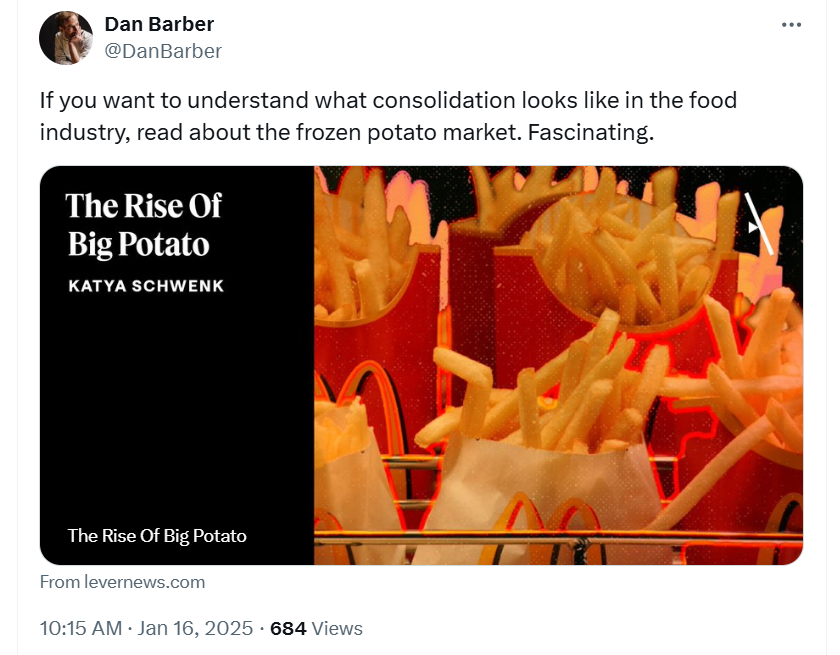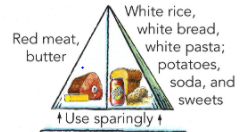One Potato
Thanks to David Ludwig for alerting me to an e-mail from the Alliance for Potato Research & Education (APRE), a trade association “dedicated to advancing the scientific understanding of the role potatoes play in promoting the health of all people.”
A new APRE-funded study published in Nutrients investigated the effect of increased dietary potassium from a whole food source – baked/boiled potatoes and baked French fries – or a potassium supplement on blood pressure and other cardiovascular disease risk factors compared to a ‘typical American’ control diet (lower potassium intake) among 30 pre-hypertensive-to-hypertensive men and women.
Results showed that baked/boiled potato consumption had the greatest benefit on reducing sodium retention, even more than the supplement, and resulted in a greater reduction in systolic blood pressure (SBP) compared to the control diet.
Further, despite commonly held misbeliefs about French fries and their role in heart-healthy lifestyles, the authors observed that a 330-calorie serving of baked French fries, when eaten as part of a ‘typical American’ diet, had no adverse effect on blood pressure or blood vessel function.
The study concludes:
This was the first controlled feeding study of potassium from food and supplements on BP and CVD outcomes in an unhealthy population…Of public health relevance is our observation that French fries in amounts typical of a large serving in a fast food restaurant has no adverse effect on blood pressure or endothelial function.
It discloses the funding source: “This research was funded by Alliance for Potato Research and Education.”
Comment: Because some (but not all) observational studies have linked potatoes, and especially French fries, to poor health outcomes, the potato industry wants research to give these foods a healthier image. This study says that potatoes are high in potassium and a high potassium-to-sodium ratio is good for blood pressure and heart disease. I could have told them that on the basis of food composition data alone: 100 grams of French fries contains 435 mg potassium versus 295 of sodium. Does that make French fries a health food? No, alas, it does not.
Once more for the record: industry-funded research is about marketing, not public health.
Two Potato
Last week, I received an emailed notification from APRE, the Alliance for Potato Research & Education announcing a new study.
For decades, people have often associated higher intakes of carbohydrate-containing foods with less healthy lifestyles. Yet, evidence suggests this view is overly simplistic, and it is instead the type and quality of carbohydrate foods that matter most for supporting health…In a newly published perspective in Nutrients, a group of nutrition researchers, who collectively make up the Quality Carbohydrate Coalition-Scientific Advisory Council (QCC-SAC), outline the opportunity for a stronger, more evidence-based approach to defining quality carbohydrate foods to support overall health and provide clearer dietary guidance.
The study: Toward an Evidence-Based Definition and Classification of Carbohydrate Food Quality: An Expert Panel Report. Kevin B. Comerford, Yanni Papanikolaou, Julie Miller Jones, Judith Rodriguez. Joanne Slavin, Siddhartha Angadi. and Adam Drewnowski. Nutrients2021, 13(8), 2667.
Conclusion: The identification of higher quality carbohydrate foods could improve evidence-based public health policies and programming—such as the 2025–2030 Dietary Guidelines for Americans.
Funding: This work was supported by the Quality Carbohydrate Coalition (QCC), which is funded by Potatoes USA. The QCC was not involved in the expert panel discussions, manuscript preparation, or the decision to submit the manuscript for publication.Conflicts of Interest: All authors are invited members of the Quality Carbohydrate Coalition’s Scientific Advisory Council (QCC-SAC). A.D. is the developer of the Nutrient Rich Food (NRF) index, a nutrient profiling model, and has received grants, contracts, and honoraria from entities, both public and private, with an interest in nutrient density of foods, complex meals, and the total diet. Y.P. is the president of Nutritional Strategies, collaborates on NHANES analyses and provides food, nutrition, and regulatory affairs consulting services for food/beverage companies and food-related associations. S.A. and J.M.J. advise the Grain Foods Foundation. J.S. has current grants from Taiyo and Barilla in the area of dietary fiber, and also serves on the Scientific Advisory Boards for Tate and Lyle and Atkins Nutritionals. J.R. has no conflicts of interest. K.B.C. is employed by FoodMinds, which provides science communications consulting services to various food and nutrition entities, including Potatoes USA and the Alliance for Potato Research and Education (APRE).
Comment: This is a successful effort by the potato industry to engage academics in support of the value of potatoes in healthful diets. The role of potatoes in health is a contentious issue in the nutrition research community (see, for example, this FrontLine interview with Walter Willett). The potato industry is fighting back by funding research (see above and also a previous post) and now engaging sympathetic academics. I think potatoes are fine, in moderation. But I wish academics would stay out of conflicted situations like this one.Reference: For a summary of research on the “funding effect”—the observations that research sponsored by food companies almost invariably produces results favorable to the sponsor’s interests and that recipients of industry funding typically did not intend to be influenced and do not recognize the influence—see my book, Unsavory Truth: How Food Companies Skew the Science of What We Eat.






